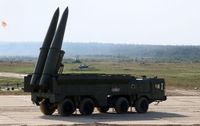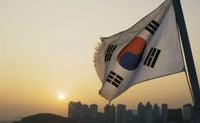In a troubling development amid ongoing tensions surrounding the Ukraine war, Russian factories have reportedly received machine tools from the South Korean company DN Solutions, which are being used to manufacture Iskander missile launchers and Lancet combat drones. This revelation, detailed by The Korea Times and based on a study by the Council on Economic Security of Ukraine, raises significant concerns over international compliance with export regulations.
The equipment, valued at over $19 million, was allegedly delivered to Russia through Chinese distributors, including a company named Silver Technology. According to customs records cited by Vladislav Vlasiuk, an advisor to the President of Ukraine on sanctions, these shipments occurred under contracts signed in 2023 and 2024. "The customs and procurement records indicate that these were deliveries of new equipment," Vlasiuk stated, emphasizing the need for further scrutiny of the supply chain.
Despite these allegations, DN Solutions has firmly denied any wrongdoing. The company claims to adhere strictly to South Korean laws, which prohibit the export of strategic products without government permission. A representative from DN Solutions stated, "We have informed dealers and agencies that the sale of our equipment to Russia and the circumvention of export controls are strictly prohibited. We have also warned them that non-compliance with this policy is not only a violation of the terms of the contract, but may lead to severe sanctions from government agencies." This assertion underscores the company's stated commitment to legal compliance.
Moreover, DN Solutions has indicated that it terminated its cooperation with Chinese firms as soon as it became aware of their involvement in exporting equipment to Russia. This move aligns with the company's narrative of maintaining ethical business practices amid growing global scrutiny.
The concerns surrounding these shipments are exacerbated by statements from Chinese officials. Lin Jian, a representative of the Chinese Foreign Ministry, asserted that China does not provide lethal weapons to any party involved in the Ukraine conflict. However, the presence of South Korean equipment at Russian military facilities raises questions about the effectiveness of export control measures and the potential for indirect complicity in the conflict.
The ongoing war in Ukraine has prompted numerous countries to impose sanctions on Russia, aiming to curb its military capabilities. The involvement of foreign suppliers, whether directly or through intermediaries, complicates these efforts and highlights the challenges in enforcing compliance. As tensions continue to escalate, the international community remains watchful of any developments that could further impact the geopolitical landscape.
Vladislav Vlasiuk's comments also suggest a broader issue of oversight within the supply chains that connect manufacturers to end-users, particularly in conflict zones. He noted that while the evidence does not necessarily imply intentional violations of the law, it could point to significant gaps in monitoring practices. Such deficiencies may warrant additional investigations to ensure that companies comply with international sanctions.
The implications of these findings extend beyond the immediate context of the Ukraine war. They raise critical questions about the responsibilities of multinational corporations in adhering to international laws and the potential consequences of their supply chains. As the global economy becomes increasingly interconnected, the risk of unintended complicity in conflicts may grow, necessitating more stringent oversight and accountability measures.
As this situation unfolds, it serves as a reminder of the complexities involved in international trade and the potential ramifications of business decisions made far from the conflict zones. The ability of companies to navigate these challenges while remaining compliant with both domestic and international laws is crucial in maintaining ethical standards in the global marketplace.
The discovery of DN Solutions' equipment at Russian military facilities not only highlights the ongoing tensions in the region but also raises important discussions about the role of technology in modern warfare. As nations continue to grapple with the implications of military advancements, the intersection of commerce and conflict will remain a focal point for policymakers and business leaders alike.
In conclusion, the revelations regarding DN Solutions and its equipment's role in the Ukraine conflict underscore the pressing need for comprehensive oversight of international trade practices, particularly in sectors related to defense and military applications. As the world watches closely, the actions taken by governments and corporations in response to these findings will be pivotal in shaping the future of global security and commerce.





